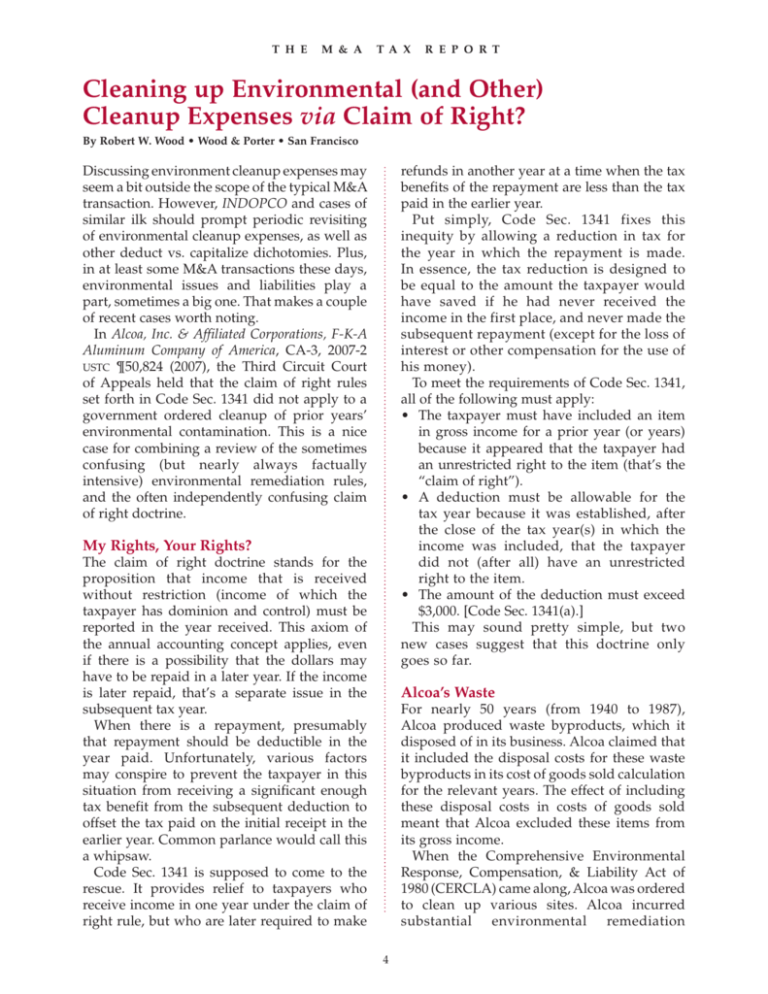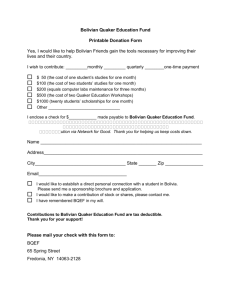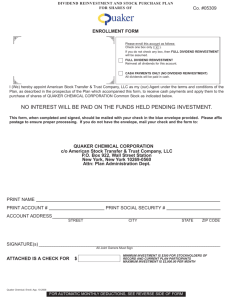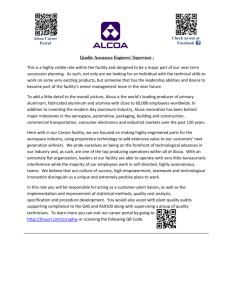Cleaning up Environmental (and Other) Cleanup
advertisement

T H E M & A T A X R E P O R T Cleaning up Environmental (and Other) Cleanup Expenses via Claim of Right? By Robert W. Wood • Wood & Porter • San Francisco refunds in another year at a time when the tax benefits of the repayment are less than the tax paid in the earlier year. Put simply, Code Sec. 1341 fixes this inequity by allowing a reduction in tax for the year in which the repayment is made. In essence, the tax reduction is designed to be equal to the amount the taxpayer would have saved if he had never received the income in the first place, and never made the subsequent repayment (except for the loss of interest or other compensation for the use of his money). To meet the requirements of Code Sec. 1341, all of the following must apply: • The taxpayer must have included an item in gross income for a prior year (or years) because it appeared that the taxpayer had an unrestricted right to the item (that’s the “claim of right”). • A deduction must be allowable for the tax year because it was established, after the close of the tax year(s) in which the income was included, that the taxpayer did not (after all) have an unrestricted right to the item. • The amount of the deduction must exceed $3,000. [Code Sec. 1341(a).] This may sound pretty simple, but two new cases suggest that this doctrine only goes so far. Discussing environment cleanup expenses may seem a bit outside the scope of the typical M&A transaction. However, INDOPCO and cases of similar ilk should prompt periodic revisiting of environmental cleanup expenses, as well as other deduct vs. capitalize dichotomies. Plus, in at least some M&A transactions these days, environmental issues and liabilities play a part, sometimes a big one. That makes a couple of recent cases worth noting. In Alcoa, Inc. & Affiliated Corporations, F-K-A Aluminum Company of America, CA-3, 2007-2 USTC ¶50,824 (2007), the Third Circuit Court of Appeals held that the claim of right rules set forth in Code Sec. 1341 did not apply to a government ordered cleanup of prior years’ environmental contamination. This is a nice case for combining a review of the sometimes confusing (but nearly always factually intensive) environmental remediation rules, and the often independently confusing claim of right doctrine. My Rights, Your Rights? The claim of right doctrine stands for the proposition that income that is received without restriction (income of which the taxpayer has dominion and control) must be reported in the year received. This axiom of the annual accounting concept applies, even if there is a possibility that the dollars may have to be repaid in a later year. If the income is later repaid, that’s a separate issue in the subsequent tax year. When there is a repayment, presumably that repayment should be deductible in the year paid. Unfortunately, various factors may conspire to prevent the taxpayer in this situation from receiving a significant enough tax benefit from the subsequent deduction to offset the tax paid on the initial receipt in the earlier year. Common parlance would call this a whipsaw. Code Sec. 1341 is supposed to come to the rescue. It provides relief to taxpayers who receive income in one year under the claim of right rule, but who are later required to make Alcoa’s Waste For nearly 50 years (from 1940 to 1987), Alcoa produced waste byproducts, which it disposed of in its business. Alcoa claimed that it included the disposal costs for these waste byproducts in its cost of goods sold calculation for the relevant years. The effect of including these disposal costs in costs of goods sold meant that Alcoa excluded these items from its gross income. When the Comprehensive Environmental Response, Compensation, & Liability Act of 1980 (CERCLA) came along, Alcoa was ordered to clean up various sites. Alcoa incurred substantial environmental remediation 4 T H E M & A T A X R E P O R T sold underpinning, but here it was antitrust liabilities rather than environmental cleanup liabilities that were the triggering event. Like Alcoa’s Code Sec. 1341 claim, Quaker State’s claim sought a rather dramatic do-over based on later-acquired knowledge. In 1994, Quaker State was sued in a class action by suppliers of crude oil. Quaker State had been buying crude oil from various oil producers from 1981 through 1995. The 1994 class action lawsuit alleged price fixing in violation of the Sherman Act. Quaker State settled the suit in 1995 for $4.4 million, paying half in 1994 and the balance in 1995. Quaker State initially deducted the settlement payments, but later filed amended tax returns seeking a refund under Code Sec. 1341. Quaker State’s theory was that its 1981–1995 income was overstated by $4.4 million, the cost of settling the class action. Predictably, the IRS disallowed the claim. Quaker State challenged that ruling in the Court of Federal Claims. Essentially, Quaker State argued that if it had incurred the settlement costs during the years when it was buying crude oil from the suppliers, its cost of goods sold would have been higher. In turn, that meant its gross income would have been lower. Quaker State argued that Code Sec. 1341 applied to the settlement payments, since the settlement of the case did require Quaker State to pay or restore to the oil suppliers an item Quaker State had previously included in its gross income (that is, because of the understated cost of goods sold). The procedural posture of this case is pretty interesting. Quaker State actually moved for partial summary judgment on its claim, and the Court of Federal Claims granted it. The trial court agreed with Quaker State that it had taken income into account originally because it believed it had a right to the income. Plus, the court found that there was a “substantive nexus” between the purchase of the crude oil and the antitrust settlement payments. But for the crude oil purchase, said the court, Quaker State would clearly not have been named as a defendant in the lawsuit. Thus, it would never have had to pay to resolve the case. expenses in 1993. Alcoa deducted these expenses on its 1993 tax return. Later, Alcoa filed a $12 million refund claim. Alcoa’s theory was that, rather than being limited to the tax benefit the 1993 deduction would normally yield, Alcoa was entitled (under Code Sec. 1341) to a much larger benefit. (The main difference was the spread in the higher corporate tax rates.) Pay Me, Please … Alcoa essentially argued that for nearly 50 years, its gross income was understated because its cost of goods sold was also understated. In other words, Alcoa was essentially arguing that it should have incurred much higher costs during all those many years to properly dispose of the waste caused by its manufacturing processes. Of course, Alcoa had not included those disposal costs in its historical cost of goods sold, because it had no idea at the time that it would later be expected to bear them. The IRS just said no to this refund claim, and the District Court agreed. On appeal in the Third Circuit, Alcoa argued that this was precisely the kind of case Code Sec. 1341 was designed to address. The Third Circuit, on the other hand, said the cleanup obligation of which Alcoa later learned was not a determination that it did not have an unrestricted right to an item of income in the earlier years. Thus, Code Sec. 1341 did not apply. After all, Alcoa could not demonstrate the restoration of an item of income to an entity from whom the income was received, or to whom the item of income should have been paid. The court agreed with the IRS that under Code Sec. 1341, the taxpayer must show that it has “restored” the amount in question to another claimant who had an actual right to it. Alcoa’s cost of goods sold argument simply did not fly. From Aluminum to Oil Interestingly, another Code Sec. 1341 case popped up on the grid shortly thereafter. This one involves Penzoil-Quaker State and was decided by the Federal Circuit. [See Penzoil-Quaker State Co., et al. v. U.S., 2008 U.S. App. LEXIS 266 (Fed. Cir. January 8, 2008).] Quaker State’s claim for relief under Code Sec. 1341 had the same cost of goods Inventory Interestingly, there was yet another claim of right doctrine oddity at work here. The IRS 5 T H E M & A T A X R E P O R T to applying Code Sec. 1341, Quaker State noted that the $2.9 million was a deductible settlement payment. Whether or not that sounds like an inconsistency to you or me, it grated on the appellate court, which perceived a real Catch 22: one’s cost of goods sold cannot be deducted, and settlement payments you make are not included in your gross income. All in all, my guess is that, in the future, fewer companies will be making the kind of arguments that Alcoa and Quaker State did. Essentially, the Court of Federal Claims says that Quaker State made a fatal conceptual error in its analysis. Quaker State treated the settlement amount as part of its cost of goods sold, and Code Sec. 1341(a)(1) requires that. On the other hand, for purposes of the “deduction allowable” requirement necessitated by Code Sec. 1341(a)(2), Quaker State treated the payment as a settlement payment. argued that the inventory exception in Code Sec. 1341 also made relief under Code Sec. 1341 unavailable here. Under the inventory exception, Code Sec. 1341 does not apply to any deduction allowable with respect to an item that was included in gross income by reason of the sale or other disposition of stock in trade. This prohibition also applies to other property of a kind which would properly have been included in the inventory of the taxpayer if on hand at the close of the prior tax year. Finally, it covers property held by the taxpayer primarily for sale to customers in the ordinary course of its trade or business. The regulations also address this topic, limiting the inventory exception to “to sales returns and allowances and similar items” that are included in gross income. [See Reg. §1.1341-1(f).] Thus, the question here was whether Quaker State was independently barred from Code Sec. 1341 relief by the inventory exception. Fortunately for Quaker State, the trial court found that the income in question here did not fit the category of a sales return, allowance, or similar item. The court even went on to say that the inventory exception did not apply to income that is restored to someone other than a customer. Thus, the trial court applied Code Sec. 1341, approving Quaker State’s hefty refund claim. Restoration? Perhaps more fundamentally, the Court of Federal Claims notes that it found no “restoration” at work here. Bear in mind that Code Sec. 1341 is modeled on an inclusion in income under a claim of right that, in a subsequent tax year, turns out to have been wrong. Here, Quaker State received funds from customers. Quaker State subsequently passed some of those funds to its crude oil suppliers under the settlement agreement. With a good deal of innovation, Quaker State essentially argued that the term “restoration” appears no where in the text of Code Sec. 1341. Indeed, Quaker State argued that the “restoration” moniker shows up only in the title of the section, and that notwithstanding that mere titular reference, there is simply no restoration requirement at all. With strings of citations, the court disagrees. Interestingly, and independently, the court concludes that Code Sec. 1341 cannot apply here because of the inventory exception. [See Code Sec. 1341(b)(2).] On Appeal The government then appealed to the federal circuit. There is a lot of good discussion in this case. Of course, it’s not good discussion if you’re Quaker State. The Court of Appeals for the Federal Circuit found that the payments to settle the lawsuit didn’t even arise from the same set of circumstances as that involving Quaker State’s cost of goods sold. Part of that turned on the nature of cost of goods sold. Technically speaking, cost of goods sold is not treated as a deduction from gross income. In fact, the cost of goods sold is subtracted from gross receipts to arrive at gross income. Based on this fundamental methodology, Quaker State had a fundamental problem. With reference to the includability requirement antecedent to Code Sec. 1341, Quaker State treated the $2.9 million in question as part of its costs of goods sold. On the other hand, to show that a deduction was allowable, which is also a prerequisite Conclusion Unfortunately, these recent Code Sec. 1341 cases suggest that Code Sec. 1341 may not be as large a taxpayer relief provision as some people may think. 6






